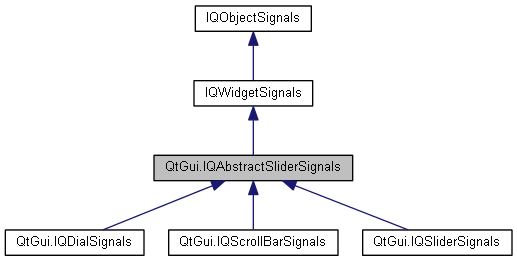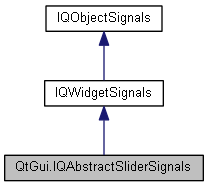|
Qyoto
4.0.5
Qyoto is a C# language binding for Qt
|
|
Qyoto
4.0.5
Qyoto is a C# language binding for Qt
|


Public Member Functions | |
| void | ValueChanged (int value) |
| | |
| void | SliderPressed () |
| | |
| void | SliderMoved (int position) |
| | |
| void | SliderReleased () |
| | |
| void | RangeChanged (int min, int max) |
| | |
| void | ActionTriggered (int action) |
| | |
 Public Member Functions inherited from QtGui.IQWidgetSignals Public Member Functions inherited from QtGui.IQWidgetSignals | |
| void | CustomContextMenuRequested (QPoint pos) |
| | |
 Public Member Functions inherited from QtCore.IQObjectSignals Public Member Functions inherited from QtCore.IQObjectSignals | |
| void | Destroyed (QObject arg1) |
| void | Destroyed () |
| | |
| void QtGui.IQAbstractSliderSignals.ActionTriggered | ( | int | action | ) |
This signal is emitted when the slider action action is triggered. Actions are SliderSingleStepAdd, SliderSingleStepSub, SliderPageStepAdd, SliderPageStepSub, SliderToMinimum, SliderToMaximum, and SliderMove.
When the signal is emitted, the sliderPosition has been adjusted according to the action, but the value has not yet been propagated (meaning the valueChanged() signal was not yet emitted), and the visual display has not been updated. In slots connected to this signal you can thus safely adjust any action by calling setSliderPosition() yourself, based on both the action and the slider's value.
See also triggerAction().
| void QtGui.IQAbstractSliderSignals.RangeChanged | ( | int | min, |
| int | max | ||
| ) |
This signal is emitted when the slider range has changed, with min being the new minimum, and max being the new maximum.
See also minimum and maximum.
| void QtGui.IQAbstractSliderSignals.SliderMoved | ( | int | position | ) |
This signal is emitted when sliderDown is true and the slider moves. This usually happens when the user is dragging the slider. The value is the new slider position.
This signal is emitted even when tracking is turned off.
See also setTracking(), valueChanged(), isSliderDown(), sliderPressed(), and sliderReleased().
| void QtGui.IQAbstractSliderSignals.SliderPressed | ( | ) |
This signal is emitted when the user presses the slider with the mouse, or programmatically when setSliderDown(true) is called.
See also sliderReleased(), sliderMoved(), and isSliderDown().
| void QtGui.IQAbstractSliderSignals.SliderReleased | ( | ) |
This signal is emitted when the user releases the slider with the mouse, or programmatically when setSliderDown(false) is called.
See also sliderPressed(), sliderMoved(), and sliderDown.
| void QtGui.IQAbstractSliderSignals.ValueChanged | ( | int | value | ) |
This signal is emitted when the slider value has changed, with the new slider value as argument.